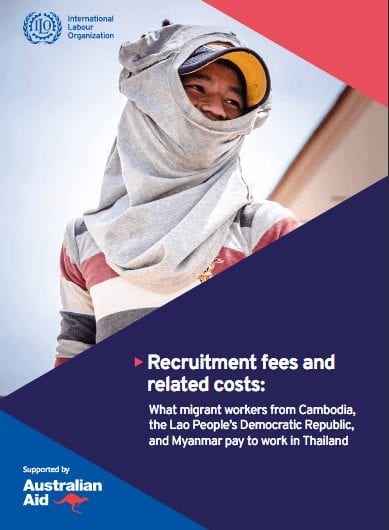
What Migrant Workers from Cambodia, the Lao People’s Democratic Republic, and Myanmar pay to work in Thailand
Thailand has a long history of labor migration, initially as a country of origin, and more recently as a destination country. Today, Thailand is host to the largest number of migrant workers of all ASEAN member states, with approximately 2.8 million documented, low-skilled, migrant workers from Cambodia, Lao PDR and Myanmar.
Labor migration is sometimes seen as a triple-win: a win for destination countries facing labor shortage, a win for countries of origin facing poverty, unemployment and skills challenges and a win for migrants in need of employment opportunities/better earning prospects. To a large extent, this all holds true. The study found that women and men migrant workers from all three origin countries earned more in Thailand then they did back home prior to migration.
At the same time exploitative practices, such as the systematic overcharging for recruitment related costs and fees undermine and diminish the development gains. To pay their recruitment related costs, many workers sell family assets, borrow money at high rates from lenders or go into debt with their employers. Some choose to go through an irregular channel, often perceived as a cheaper option, while others overstay their visa duration, thereby becoming irregular migrants. Both these strategies rendering them vulnerable to further exploitation, including forced labor or human trafficking.
Reducing crippling recruitment costs could lead to enormous benefits: Not only would this facilitate access to foreign employment opportunities, but also help counter irregular migration, and result in larger remittance flows to migrant households which could be used for education, health and other productive uses.
There is a global consensus that recruitment related fees and costs should be reduced, and that workers should not be responsible to pay these costs and fees. Not only is it a core provision of the ILO Private Employment Agencies Convention, 1997 (No. 181) but it is also recognized as an indicator of progress towards the Sustainable Development Goal 10 (Reduce inequality within and among countries).
This report presents the findings of a survey on recruitment fees and related costs paid by migrant workers from Cambodia, Lao PDR and Myanmar in order to work in Thailand. It shows that on average –regardless of the occupation/channel/status – the worker-paid recruitment costs and fees amount to about two month of wages. These costs and fees could be considerably reduced through effective regulation, enforcement and information dissemination. The survey was conducted under the framework of the ILO and World Bank KNOMAD initiative which includes a standard methodology and questionnaire designed to measure migration and recruitment costs for low-skilled migrant workers.
The migration process implies complex challenges in terms of governance, migrant workers’ protection, migration and development linkages, and international cooperation. This report can help forge policies maximizing the contribution of labour migration to fair and sustainable growth in ASEAN
Read the full report here.
